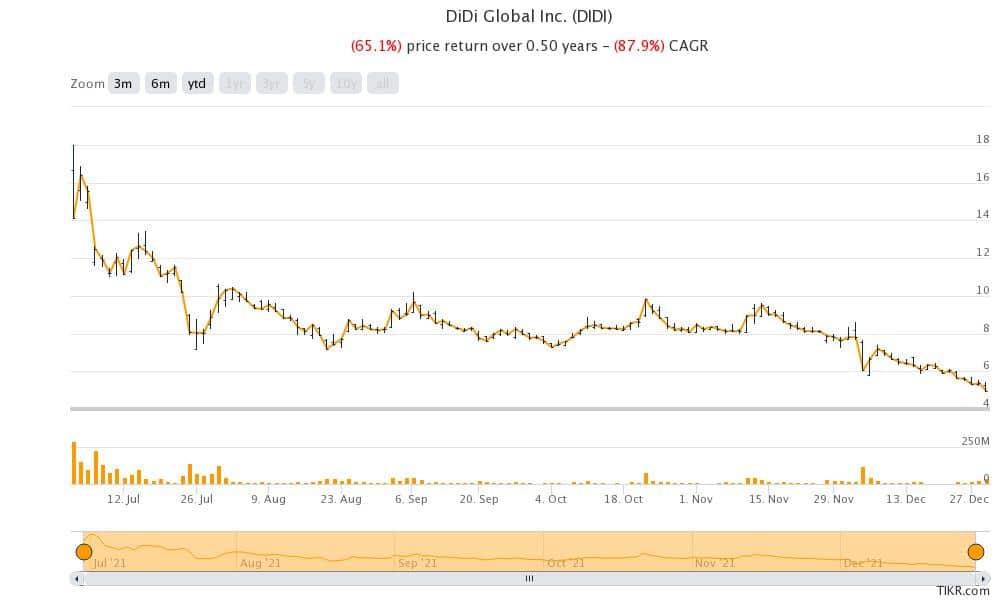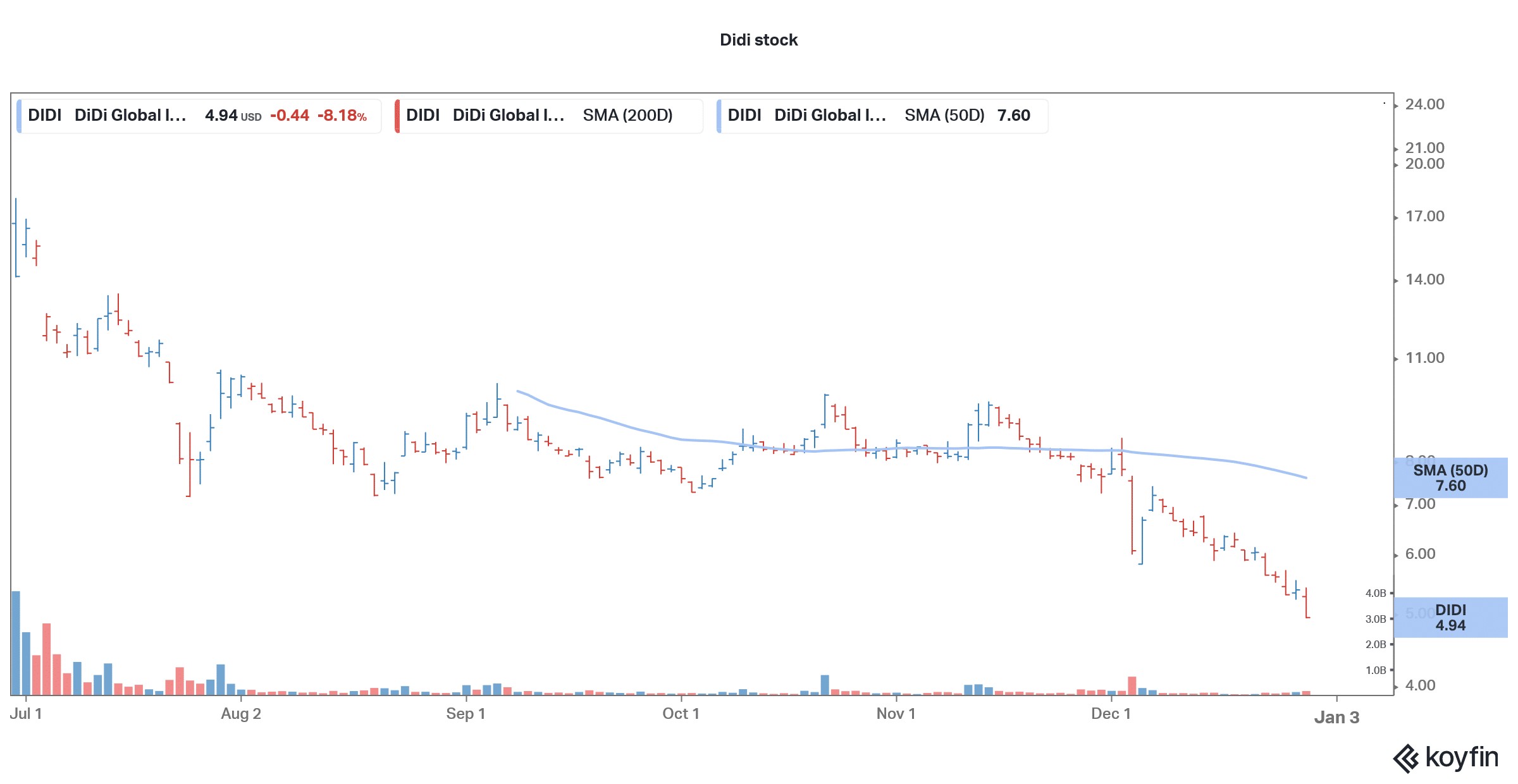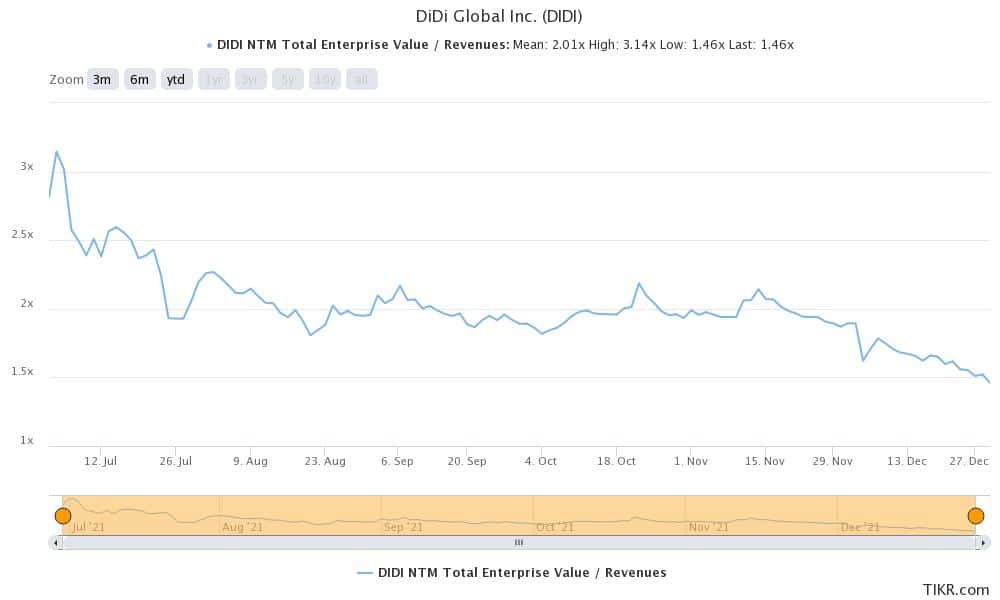DiDi Stock Price Down 3.5% Today – Time to Buy DIDI Stock?
Please note that we are not authorised to provide any investment advice. The content on this page is for information purposes only.
DiDi Global (NYSE: DIDI) stock fell to a new all-time low of $4.93 yesterday and looks set to continue its slump in today’s price action also. The company had priced the IPO at $14, which was at the upper end of the price range, but now trades at around a third of that price.
Didi is among the worst IPOs of 2021. Another Chinese company RLX Technology is also on the list as China’s tech crackdown took a toll on Chinese tech companies, especially those that trade on the US stock markets.
Didi stock recent developments

Didi has released its earnings for the September quarter. The company’s revenues fell to $6.6 billion in the quarter, which was 1.6% lower than the corresponding period in 2020. Revenues fell 13% as compared to the June quarter. Notably, during the quarter, China had blocked new downloads of the app which seems to have taken a toll on the company’s performance.
It has been a double whammy for Didi amid China’s crackdown. Firstly, China’s new data laws would hamper the company’s ability to grow its business in the country, which is its biggest market. Secondly, its expenses have also risen as it has had to increase the payouts for drivers. Chinese President Xi Jinping is pushing ahead with his “common prosperity” program. Among others, the country is pushing for better working conditions and compensation for gig economy workers.
68% of all retail investor accounts lose money when trading CFDs with this provider.
Xi Jinping’s common prosperity program
While gig economy workers across the world are demanding better compensation, and in many countries the matter is sub-judice, China is a different ballgame where the communist party’s whip prevails. While better compensation for gig economy workers is a step in the right direction, Chinese companies might have to commit more towards the common prosperity.
Alibaba has also vowed to invest billions towards Jinping’s common prosperity. Meanwhile, while Alibaba is a profitable company and can afford to part ways with some of the profits, Didi is posting massive losses, like most ride-hailing companies globally. If anything, the company’s losses swelled to $4.7 billion in the most recent quarter.
Didi to go for listing for introduction in Hong Kong
Reportedly, Didi would list by the introduction in Hong Kong. Under the mechanism, which is easier and less time-consuming, the company would not raise cash from the listing and the existing US stockholders would simply swap their US shares for the Hong Kong shares. Didi has blocked company insiders to sell shares before the Hong Kong listing.
The move comes after, in an unprecedented step, China asked the company to delist from the US within months of the listing.

Delisting of Chinese stocks
Didi’s delisting did not exactly come out of the blues though and it had warned of the regulatory issues in China in its IPO filings only. “We cannot assure you that the regulatory authorities will be satisfied with our self-inspection results or that we will not be subject to any penalty with respect to any violations of anti-monopoly, anti-unfair competition, pricing, advertisement, privacy protection, food safety, product quality, tax and other related laws and regulations,” it said in the IPO filings.
The ride-hailing company warned of troubles ahead and added, “We expect that these areas will receive greater and continued attention and scrutiny from regulators and the general public going forward.”
Didi investors lost billions
The company decided to override the concerns raised by the Chinese regulators, which is not something that we see too often in the communist country. The fact that two of the largest Didi investors, namely SoftBank and Uber are non-Chinese entities, only complicated the matter. Also, the company processes a lot of data of Chinese citizens which China fears might be compromised in case of a foreign listing.
After Didi delisting, there are fears that other Chinese companies, especially those that trade as a VIE (variable interest entity), might also get delisted in China. This has taken a toll on US-listed Chinese stocks and they now trade at a significant discount to their US-peers.
Didi stock forecast
The forecast for DiDi stock would eventually depend on the regulatory environment in the country. That said, it has an undeniable leadership position in the $50 billion Chinese ride-hailing market, which is expected to double by 2025. Amid the recent crash, the company’s market cap has dropped below $24 billion. To put that in perspective, Southeast Asian ride-hailing company Grab, which recently went public in a SPAC reverse merger, has a market cap of $26 billion.
Didi was valued at around $60 billion in the private market ahead of the IPO. Uber and SoftBank have emerged as the biggest losers from the IPO. SoftBank is been particularly negatively impacted by China’s crackdown as it holds stakes in several Chinese companies and is the largest shareholder of Alibaba.

Should you buy Didi stock?
It is tough to build a case for Didi looking at the continued regulatory crackdown in China. It might appear cheap after the steep crash, but so do other Chinese stocks like Alibaba. However, if you are willing to take the extra risk of investing in a company that faces a crackdown in China, you can still consider Chinese stocks.
UBS is of the view that Chinese stocks, especially those listed in Hong Kong look attractive. “The policy risk tightening, we do think that most of that is actually over and done with,” said UBS Global Wealth Management’s Kelvin Tay. He added, “What you’re going to get going forward is probably fine tuning of the measures and not, you know, an unleashing of an overhaul of the system similar to what we had in the tuition industry in July this year.”






